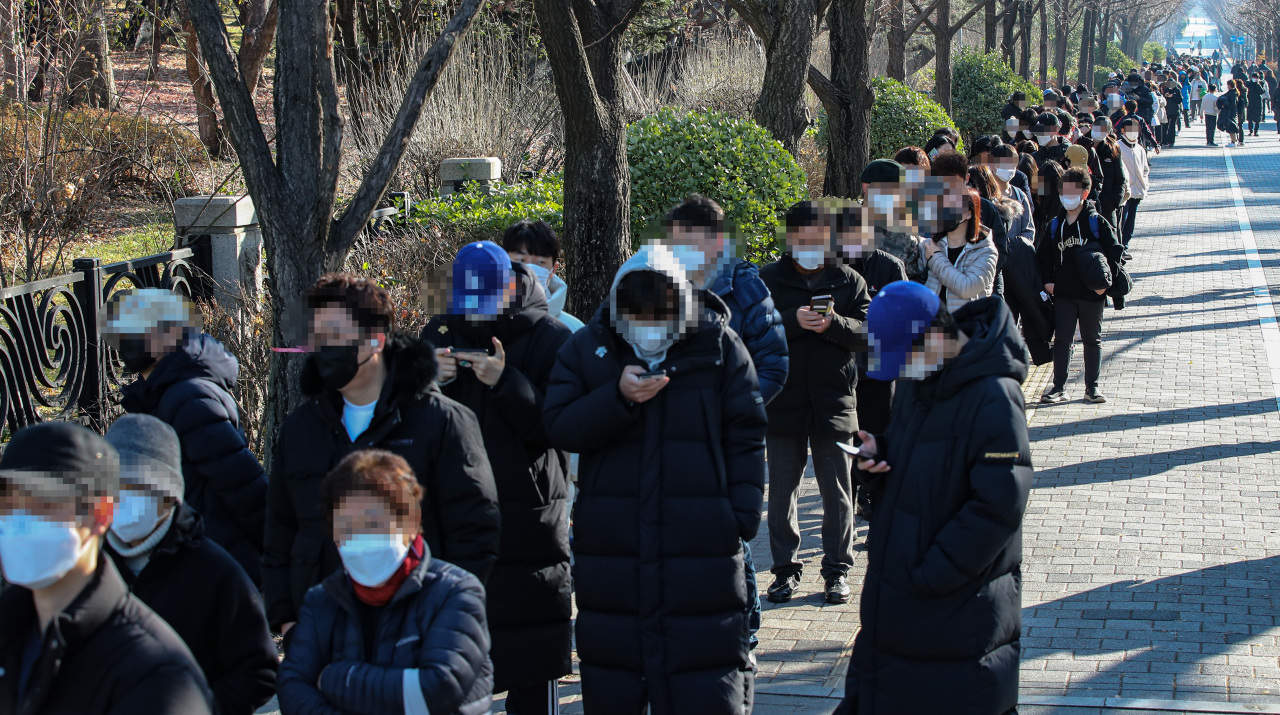Korea crashes headlong into worst crisis yet in pandemic
By Im Eun-byelPublished : Dec. 8, 2021 - 15:37

South Korea’s daily COVID-19 cases reached an all-time high Wednesday, surpassing 7,000 for the first time since the virus crisis began nearly two years ago.
The Korea Disease Control and Prevention Agency said 7,175 cases were registered in the preceding 24 hours to Tuesday midnight, exceeding the 7,000 mark for the first time, a week after staying in the 5,000 range since Dec. 1.
The latest tally puts the country’s total caseload at 489,484.
The number of patients in serious condition also reached its highest at 840, after staying in the 700s for a week.
Authorities said there were two new cases of the omicron variant infection, pushing the total to 38. Of those cases, 29 were domestic transmissions and nine were imported cases from abroad.
The disease control authorities are contact-tracing some 1,700 people linked to an omicron cluster infection at a church in Incheon. Authorities have also confirmed an omicron infection with no reported “close contact” at a restaurant, leaving open the possibility of airborne transmission.
Due to the church cluster outbreak, the government is also considering expanding its “vaccine pass” system to religious facilities, which will ban unvaccinated people from attending religious services without recent negative PCR test results.
“The virus spread is fierce. New daily cases have surpassed 7,000 today, following more than 5,000 new infections a day last week,” Prime Minister Kim Boo-kyum, who leads the Korean government’s COVID-19 response, said at a meeting held Wednesday. “The availability of medical staff is at risk.”
“For the sustainability of the country’s medical response, the government will enhance the current at-home care system,” Kim said.
Not only hospitals but also clinics will manage at-home care patients. The required quarantine period for those living with COVID-19 patients at home will also be shortened to seven days from 10 days, on the condition that the co-habitants have been fully vaccinated.
To support at-home care, the government will give extra relief grants to families with breakthrough COVID-19 cases or patients aged 18 or under. A four-person household, for example, will be granted 1.36 million won ($1,200) to cover their living expenses for 10 days.
From next year, oral COVID-19 medication will be given to at-home patients in serious condition.
Greater Seoul has been heavily hit by the pandemic. Of the total new cases, some 5,584 of them were from the capital area, accounting for 78.2 percent of the domestic infections.
According to the Seoul Metropolitan Government’s briefing Wednesday, 64 percent of the 2,901 newly confirmed patients in Seoul are breakthrough infection cases.
Hospital beds are full in the capital area. As of Wednesday in Greater Seoul, some 860 people have had to wait more than a day to be admitted to a hospital. Among them, 119 had waited for more than two days, followed by 94 for three days and 358 for four days.
The Seoul city government said the average number of people waiting for hospital beds has been between 400 and 500 a day over the past few days.
“In the Greater Seoul area, where nearly 80 percent of the total confirmed cases are concentrated, we are securing hospital beds with the help of medical staff, but it is hard to catch up with the increase in speed of new cases,” Kim said.
Amid the crisis, Kim stressed encouraging vaccination for all age groups.
“More than 35 percent of the total COVID-19 patients are in their 60s or are older. Those above 60 also take up 84 percent of the critically ill patients,” Kim said, urging older people to get vaccinated.
In regard to complaints and criticism against the government’s decision to expand their vaccine rollout to those aged between 12 and 18, Kim said, “We again appeal to the parents.”
“We decided on such a measure as we have concluded that expanding vaccination to youths would be a way to protect them and our community, after analyzing and studying many other cases from other countries.”
“We will provide data for those who are excessively worried about the vaccination plan,” he said. “Parents should not be scared about (the vaccination) which can protect our children.”
Just two weeks after South Korea adopted the “living with COVID-19” scheme and eased some distancing rules, the COVID-19 situation worsened significantly. In response, authorities have limited private gatherings to six people in the capital area and eight in other regions for four weeks from Monday.
By Im Eun-byel (silverstar@heraldcorp.com)







![[KH Explains] Hyundai's full hybrid edge to pay off amid slow transition to pure EVs](http://res.heraldm.com/phpwas/restmb_idxmake.php?idx=644&simg=/content/image/2024/04/18/20240418050645_0.jpg&u=20240419100350)







![[From the Scene] Monks, Buddhists hail return of remains of Buddhas](http://res.heraldm.com/phpwas/restmb_idxmake.php?idx=652&simg=/content/image/2024/04/19/20240419050617_0.jpg&u=20240419175937)

![[KH Explains] Hyundai's full hybrid edge to pay off amid slow transition to pure EVs](http://res.heraldm.com/phpwas/restmb_idxmake.php?idx=652&simg=/content/image/2024/04/18/20240418050645_0.jpg&u=20240419100350)

![[Today’s K-pop] Illit drops debut single remix](http://res.heraldm.com/phpwas/restmb_idxmake.php?idx=642&simg=/content/image/2024/04/19/20240419050612_0.jpg&u=)